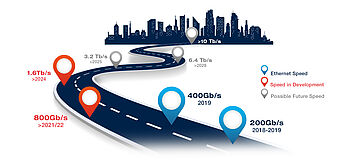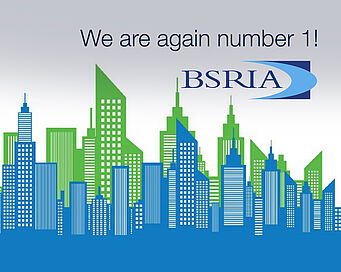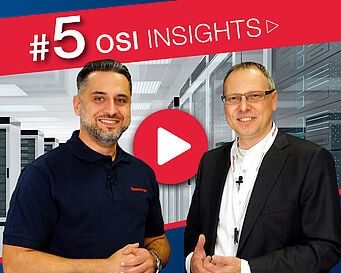How Rosenberger OSI sees the developments and trends in its markets and the world of work in general
The last few years have presented many companies with enormous challenges, ranging from the COVID-19 pandemic and a shortage of skilled workers to supply chain bottlenecks. All of this required a rethink and, as a result, an adjustment of internal company structures. The decisive factor here is how one approaches these challenging tasks. Rosenberger OSI also faced – and still faces – these tasks, but the company looks positively to the future. Despite the current time of crisis, the medium-sized company is enjoying permanent growth and thus securing jobs in the long term. “2022 was the most successful year so far for Rosenberger OSI – despite the current threats to society and the economy. The decisive factor for us this year was that we, as a company handled the new challenges skillfully and always functioned perfectly. The demand for our solutions and services continues unabated, which is why we are consistently pushing ahead with expanding our resources and capacities in 2023,” emphasises Thomas Schmidt, Managing Director of Rosenberger OSI.
New forms of work are gaining in importance
Due to the COVID-19 pandemic, the trend to shift the world of work from the office to the home office became more marked as early as 2020. In the meantime, teleworking has also become an antidote to the shortage of skilled workers. Employees, especially Generation Y, are no longer motivated solely by money and status, resulting in new workplace concepts, such as the “New Work” megatrend, becoming increasingly important. The cornerstones here are the development of potential, flexible work design, work-life balance and flat hierarchies. The focus is increasingly on people. Digital tools and agile working methods are essential components. However, this also includes “New Leadership”, in which a culture of trust replaces hierarchical leadership styles.
Process organisation promotes agile working
Rosenberger OSI recognised this trend early on. As early as 2018, the company completed a three-year transformation to a process organisation without classic hierarchies and rigid structures. Today, Rosenberger OSI has a future-proof organisation consisting of enthusiastic employees working together in teams with a generous freedom of choice. The company is now taking the next step: a newly founded project team is optimising the spatial design of the working worlds and the social hubs. The aim is to better adapt to the various teams’ different needs and individual wishes, whether this involves highly concentrated solo work, creative exchange of information or coordination-intensive cooperation in teamwork. The best possible space should be available for all these work situations in the future, increasing the attractiveness of Rosenberger OSI as an employer.
Securing the supply chain with innovative solutions
One challenge for 2023 feared by many companies is supply bottlenecks. The Swabian solution provider also asked itself how this could be countered. As a result, Rosenberger OSI is working on the introduction of optimised warehouse management techniques in a digitalisation working group on the one hand. Conversely, the company is also investing specifically in European procurement and focusing on long-term partnerships. Customers were also integrated into a collaborative forecasting process. “We listen carefully to the customer. This is one of the most important characteristics of our employees. If we know the problems, we can find the right solution for our customers and the different markets. This is a fairly simple formula for success and expresses what others call customer centricity,” says Thomas Schmidt, Managing Director of Rosenberger OSI.
Identifying trends at an early stage
In addition to market observation, customer centricity is an essential tool for identifying future needs at an early stage – in other words, planning and localising the relevant products and service capacities in advance. As a global expert in innovative cabling infrastructure, Rosenberger OSI has identified IT security, data center consolidation and school digitalisation as critical topics for 2023 because the widespread availability of digital infrastructures and services continues to gain enormous importance in all areas of life. It has been shown repeatedly how vulnerable our society has become in this respect.
IT security – increasingly complex threats & dynamic regulations
The increase in possible threat scenarios such as environmental disasters, terrorist attacks, and cybercrime means that the guidelines for operators of critical infrastructures are continuously becoming more stringent. The KRITIS regulation of the Federal Office for Information Security (BSI) is mandatory in Germany. It is also essential to keep an eye on the development of the EU regulations NIS2 and RCE. These European guidelines, IT infrastructures and providers will be regulated more comprehensively in the future. The experts at Rosenberger OSI support companies in finding the right strategy for their IT infrastructures. Together with our customers, we determine the necessary changes that have to be made to meet the requirements of the BSI regulation. We then create a catalogue of measures for more technical and/or organisational steps that should be taken.
Co-location and on-premises renewal vs the cloud – critical decision criteria
In an IT transformation, the right balance must be found. Here various factors play a role for our customers: besides fail-safety, continuity and sustainability, high-speed applications are most in demand – always considering the available budget. This is why Rosenberger OSI focuses on optimising future-proof cabling solutions for glass fibre-based connectivity heading towards 400G/800G. As part of our membership in the GERMAN DATACENTER ASSOCIATION, our specialists regularly discuss technology and market trends with other industry experts and work to sustainably improve the framework conditions for the operation of data centers in Germany.







